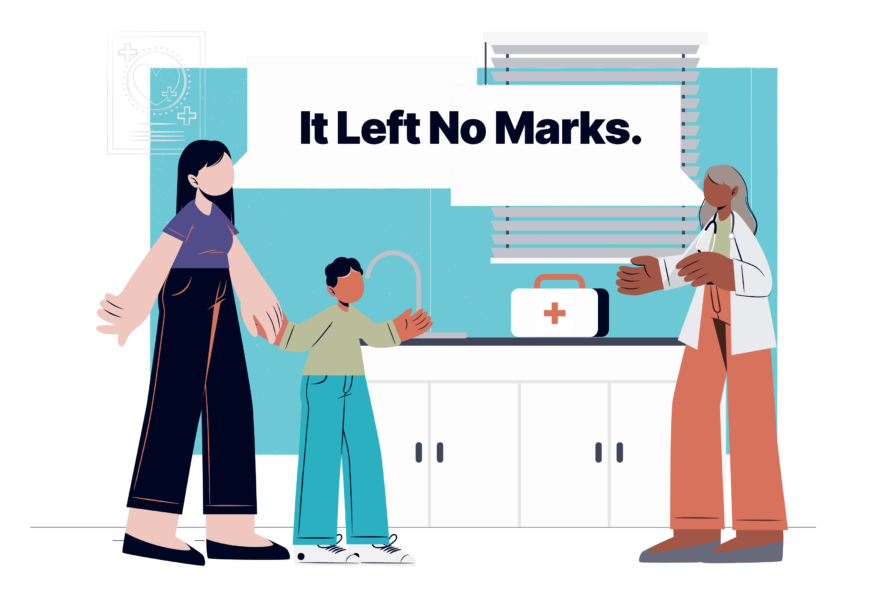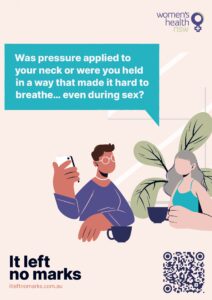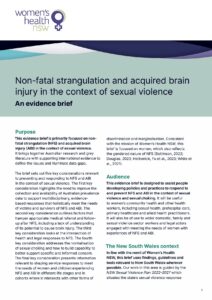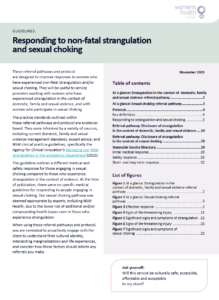
There has been an increased focus in NSW on improving acute care for victims and survivors of non-fatal strangulation. Not all women experiencing strangulation present at an emergency department in the days following the event. Some women disclose strangulation months to years after the event, often to counsellors and caseworkers in community health settings. Some women have experienced repetitive incidents of strangulation or engaged in sexual choking practices over long periods of time, and show signs and symptoms associated with acquired brain injury. The Pathways Project was designed to help connect these women to appropriate healthcare.
General Practitioners (GPs) are the main coordinating point for addressing the health needs of women who have experienced strangulation, as explained by Dr Frances Chen in this HealthEd podcast. This clinical article by HealthEd also discusses acute and chronic presentation and management of non-fatal strangulation in primary care settings.
When GPs work in tandem with women’s community health centres, we can ensure everyone has referral pathways, protocols and services at their fingertips to provide women with useful and responsive healthcare following strangulation. This might include sending the woman to the emergency department for recent or severe cases, or to neurology, psychology, brain injury clinics, or other allied healthcare providers to support her ongoing recovery process and long-term health needs. Or it might mean connecting a woman who presents with these issues at your practice with her local women’s health centre to help her manage the emotional and psychosocial impacts of strangulation. When strangulation is experienced as part of sexual violence, the NSW Sexual Violence Helpline (1800 424 017) can also be useful. It has trained counsellors who are ready, willing and able to speak to victims and survivors, and to GPs supporting patients who have experienced sexual violence.
As a GP, you will also need to look after your own health and wellbeing. Healthcare providers are not immune to vicarious trauma. The RACGP’s The White Book has a range of suggestions to help you stay safe and healthy: Keeping the health professional safe and healthy
Health promotion
GPs also have a role in health promotion. This can be done personally, by familiarising yourself with key messages about sexual choking or by watching this HealthEd presentation. It can also be done by sharing resources with your patients, like this Women’s Health NSW video explaining what happens in the body when you are strangled. Other resources you can share with your patients include these print-ready promotional resources designed to connect women to this website and the information it contains for women about strangulation and sexual choking: It Left No Marks postcard, poster and wallet card
Working with men
If you get disclosures about using violence from men in your practice, we have created this video showing how you might devise evidence-based health promotion messages about sexual choking that are suitable for men who use power and control in their relationships.
The evidence
This Women’s Health NSW evidence brief brings together Australian research and grey literature with supporting international evidence to define the issues and illuminate data gaps relevant to preventing and responding to NFS and acquired brain injury (ABI) in the context of sexual violence. The brief covers factors that hamper appropriate medical referral and follow-up after NFS, including a lack of understanding of its potential to cause brain injury. It also highlights the need to improve Australian prevalence data to support multidisciplinary, evidence-based responses that holistically meet the needs of victims and survivors. Non-fatal strangulation and acquired brain injury in the context of sexual violence: An evidence brief
Medical case notes and record keeping
Developed in conjunction with Women’s Legal Service NSW, this 2024 Ask Lois webinar provides information about how to ensure medical case notes and record keeping can best support women who opt to pursue legal or compensatory outcomes following strangulation: Ask Lois webinar on strangulation. Women’s Legal Service NSW have also produced a separate webinar on subpoenas and record keeping that you can access here: Ask Lois webinar on subpoenas and case notes
Being part of a referral pathway
Community health services, like women’s health centres, may reach out to ask if you’ll be on their referral pathway for strangulation or sexual choking. Women’s Health NSW designed Guidelines to help them build local referral pathways. The Guidelines explain the circumstances under which women may be referred to healthcare services, and the things the service provider has considered in making that referral. Guidelines: Responding to non-fatal strangulation and sexual choking
 Women may be referred to you using a medical referral letter that sets out the reason the woman has been referred, including when the mechanism of injury for a brain injury (strangulation or sexual choking) occurred, and the impacts she feels it has had on her life. This recorded strangulation assessment will give you an idea of the conversation that takes place between the woman and her counsellor before a medical referral letter is filled out. The letter also includes clinical resources, or you can look up strangulation on HealthPathways (See: Abuse, violence and neglect/physical assault). Central and Eastern Sydney PHN also have a recorded webinar on supporting patients who have experienced strangulation in general practice.
Women may be referred to you using a medical referral letter that sets out the reason the woman has been referred, including when the mechanism of injury for a brain injury (strangulation or sexual choking) occurred, and the impacts she feels it has had on her life. This recorded strangulation assessment will give you an idea of the conversation that takes place between the woman and her counsellor before a medical referral letter is filled out. The letter also includes clinical resources, or you can look up strangulation on HealthPathways (See: Abuse, violence and neglect/physical assault). Central and Eastern Sydney PHN also have a recorded webinar on supporting patients who have experienced strangulation in general practice.
Further training
For a quick introduction to strangulation and sexual choking as women’s health issues, we created this 45-minutes recorded training. It is designed to  improve your confidence in responding to women who have experienced strangulation, sexual choking, and who may be suffering from an acquired brain injury. https://www.itleftnomarks.com.au/resources/workforce-training-strangulation-sexual-choking-and-acquired-brain-injury/
improve your confidence in responding to women who have experienced strangulation, sexual choking, and who may be suffering from an acquired brain injury. https://www.itleftnomarks.com.au/resources/workforce-training-strangulation-sexual-choking-and-acquired-brain-injury/
For a more developed understanding, Monash University offers a three-unit course for healthcare professionals that is designed to improve recognition and appropriate responses to adult disclosures of sexual violence. The course, Recognising and Responding to Sexual Violence in Adults, is delivered in online modules over the course of six weeks and covers strangulation in the second training module. It is delivered by the Victorian Institute of Forensic Medicine as Continuing Professional Development (CPD) training and accredited by multiple professional bodies, including the Royal Australian College of General Practitioners (RACGP) and the Australian College of Nursing (ACN). https://www.monash.edu/medicine/sphpm/study/professional-education/responding-to-sexual-violence
Further reading
Australian Journal of General Practice. (2022). ‘I thought I was About to Die’: Management of Non-fatal Strangulation in General Practice. https://www1.racgp.org.au/getattachment/d0b73b93-f576-49ee-987a-3df6142e9ea8/Management-of-non-fatal-strangulation.aspx
Victorian Institute of Forensic Medicine. (2022). It’s Never OK [VIDEO]. https://www.vifm.org/non-fatal-strangulation/
Agency for Clinical Innovation (2022): Managing non-fatal strangulation in the emergency department. https://aci.health.nsw.gov.au/__data/assets/pdf_file/0005/750344/ACI-Non-fatal-strangulation-clinical-practice-guide.pdf
Adhikari, S. P., Maldonado-Rodriguez, N., … & Donkelaar, P. van. (2024). Characterizing Possible Acute Brain Injury in Women Experiencing Intimate Partner Violence: A Retrospective Chart Review. https://doi.org/10.1177/10778012231159417
Australian Social Work. (2024). Enabling Emergency Department Staff to Support Domestic Violence Victims of Strangulation. https://doi.org/10.1080/0312407X.2024.2399562
Royal Australian College of General Practitioners. (2023). Responding to non-fatal strangulation: What you cannot see [WEBINAR]. https://soundcloud.com/nswact-racgp/responding-to-nfs
Royal Australian College of General Practitioners. (2022). Abuse and violence: Working with our patients in general practice. https://www.racgp.org.au/getattachment/4ab6102c-67d9-4440-9398-a3ae759164ef/Abuse-and-violence-Working-with-our-patients-in-general-practice.aspx
Royal Australian College of General Practitioners. (2024). Responding to children and adults who have experienced non-fatal strangulation [WEBINAR] https://youtu.be/mWtmKyZGDtQ
HealthEd. (2024). Non-fatal strangulation detection and management. https://www.healthed.com.au/clinical_articles/non-fatal-strangulation-detection-and-management/
HealthEd. (2025). When to suspect and screen for non-fatal strangulation [PODCAST]. https://www.healthed.com.au/podcasts/when-to-suspect-and-screen-for-non-fatal-strangulation/
HealthEd. (2025). Supporting victims of sexual assault within a primary care setting [PODCAST]. https://www.healthed.com.au/podcasts/supporting-victims-of-sexual-assault-within-primary-care-setting/
HealthEd. (2025). Sexual violence: Long-term follow-up and management in primary care. [PODCAST]. https://www.healthed.com.au/podcasts/sexual-violence-long-term-follow-up-and-management-in-primary-care/
Mullin, S. & Hardiman, L. (2025).The characteristics and circumstances of fatal interpersonal strangulation in Australian adults. https://journals.sagepub.com/doi/10.1177/08862605251321001
Women’s Health NSW. (2024). Sexual choking: An emerging health issue [WEBINAR]. https://www.itleftnomarks.com.au/resources/healthed-medical-update-2024/
Sharman, L.S., Fitzgerald, R. & Douglas, H. (2024). Prevalence of Sexual Strangulation/Choking Among Australian 18–35 Year-Olds. https://doi.org/10.1007/s10508-024-02937-y
Conte, I., Sharman, L. & Douglas, H. (2025): Choking/Strangulation During Sex: Understanding and Negotiating “Safety” Among 18-35 Year Old Australians https://link.springer.com/article/10.1007/s10508-025-03097-3
Women’s Legal Service NSW (2019): “When she talks to you about the violence”: A toolkit for GPs in NSW https://www.wlsnsw.org.au/newly-updated-gp-toolkit/
Medicare Benefits Schedule Online (2023): Introduction of new Level E consultation items lasting 60 minutes or more https://www.mbsonline.gov.au/internet/mbsonline/publishing.nsf/Content/Factsheet-intro%20of%20lvl%20E
